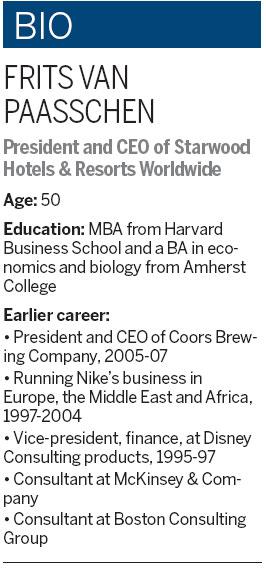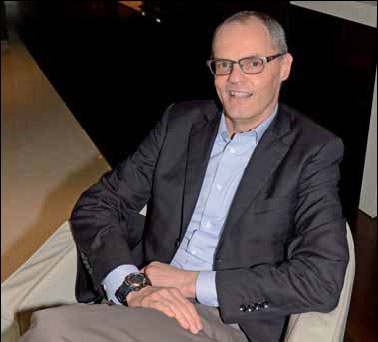Hitching his Starwood to China
Updated: 2012-05-18 07:53
By Mark Graham (China Daily)
|
|||||||||||
|
Frits van Paasschen says the scale of China's internal travel market provides growth opportunities for hoteliers. Mark Graham / For China Daily |
CEO of one of world's biggest five-star chains says future 'is written in Chinese'
When Frits van Paasschen first visited China as a backpacker, staying in basic accommodation and traveling on crowded buses and trains, little did he imagine that two decades later, he would be returning as the boss of a five-star hotel chain.
The senior executive retains vivid memories of those days, traveling the length and breadth of the country and leaving via the Karakoram Highway from China to Pakistan, clinging precariously to the roof of a pick-up truck.
Nowadays, van Paasschen flies business class on regular visits to China from his New York head office - and stays in the luxury properties of the St Regis, Westin, Sheraton and Le Mridien hotels that make up the Starwood portfolio.
Van Paasschen is president and CEO of Starwood, one of the largest hotel management groups in the world which is adding to its China portfolio at a phenomenal rate: this year alone will see 23 new properties open - roughly one every fortnight - bringing the total to 100.

The country is considered to be so important that last year the boss flew the entire senior management team to China for a month's visit; executive meetings were held wherever they happened to be on their grand China tour.
"If a picture is worth a thousand words, then a visit is worth ten thousand," says van Paasschen. "I could have got the statistics and stayed behind at my PC in New York but it is important to build relationships; almost all the hotels, 95 percent, are owned by someone else so it is more like a marriage than a transaction.
"Owners and developers have grown with our team here and they don't need my assistance or advice, but the ability to bring the leadership of the company and show that the market in China matters is an important part of the relationship. We can talk about whether a location makes sense and look at opportunities.
"Take the W brand for example: we are opening them around the world and we are on the verge of a great growth episode for that brand here in China. You want to have it in a specific type of location and an owner who has the right appreciation for what that brand is about."
There were a number of whimsical moments on the trip when van Paasschen went back to specific sites that he took in during the mid-1980s visit to China. He recalls going to the Sheraton Great Wall hotel in Beijing to take advantage of the air-conditioning: back then, dining in its high-end restaurants was not feasible on a backpacker budget. Also memorable was looking at the soaring skyscrapers of Pudong in Shanghai, built on land that van Paasschen remembers as derelict warehouses and paddy fields.
"Literally one of the high points was being on the top floor of what will be the St Regis in Shenzhen on the 100th floor of that building, looking out and toward Hong Kong and seeing that the Shenzhen side looks snazzier and more well developed than the New Territories of Hong Kong.
"When I am asked about the future I say 'I can't read it, it is written in Chinese!' There are many good years ahead there, not without their fits and starts, but the appetite for growth and the openness of this economy and the absolute scale of just the internal market are all amazing drivers for growth.
"We talk quite a bit about globalization and this is probably the biggest single growth opportunity for our industry. Never at any time in human history have so many people come into prosperity at once. A lot of us feel so lucky to participate in what is going on here and visit these amazing hotels; you have a better idea of the way the world works.
"The next phase here is the internal travel market. The latest figure for us is 58 percent Chinese (mainland) nationals in our hotels and that figure does not include Chinese from Hong Kong and Taiwan and the diaspora.
"When I first came to China with Starwood three years ago, we had a discussion that our loyalty program did not have collateral in Chinese and the name for Starwood for guests in Chinese was somewhat awkward. I thought this is one of the most obvious things I have ever heard. We were a US company operating hotels in China and we were so focused on signing up English speaking guests that we had lagged with the opportunity. I said 'how about changing it tomorrow' and the local team were very energized by that.
"In the hotel business we live with decisions that are frozen in time. I was recently in the beer business and you can change a marketing campaign, or packaging design, and you don't live with stuff that you had many years ago. The old product vanishes off the shelf. Here, we have a 20-year contract and you see things that might have been a good idea five years ago but make no sense today. You need to explore the nuances and implications for the future."
Van Paasschen is a relative newcomer to an industry where most executives generally rise gradually through the hotel ranks to senior, strategy-formulating positions.
Before joining Starwood, van Paasschen, 50, was president and CEO of Coors Brewing Company, where he successfully turned around market share and profitability by marketing and selling an array of iconic brands.
Earlier in his career, the Netherlands-born, American-educated father of three spent seven years with the sports giant Nike, overseeing business in Europe, the Middle East and Africa.
He has also worked for Disney Consumer Products, served as chairman of the European-American Industrial Council, lectured in economics at Harvard College and has been a guest host on the CNBC show Squawk Box. That broad range of experience - and fluency in five languages - has helped to shape a management style he describes as informal and accessible.
He says: "I try to be direct and make sure there is something that is not unspoken but in a business as complicated and big as ours, all decisions should not come to me. I am not in the business of walking into a room and deciding we need a different lampshade because whoever picked the lampshade will think that their job is not very interesting and we will suddenly be in the business of ordering a lot of new lampshades.
"But I do want to be in the business of putting a culture and strategy and a way of working in place where we are going to end up with the best lampshades, metaphorically speaking. The balance between global consistency of our brands, local relevance and the operational challenges are appropriately reflected where people can be open and direct and held accountable."
When not jetting around the globe to visit the Starwood portfolio, the CEO can be found at home in the east-coast state of Massachusetts. He is a fitness fanatic who has taken part in marathons, ultra-marathons and triathlons; but since recent knee surgery, he has scales back a little, focusing more on swimming and gym-based exercise.
The executive's diet is strictly vegan, meaning he has to say no to many of the gourmet restaurant dishes at five-star hotels in China and elsewhere. Chefs in the properties generally take up the challenge to rustle up a special non-meat dish for the visiting boss.
China Daily
(China Daily 05/18/2012 page24)
Today's Top News
Rescuers race against time for quake victims
Telecom workers restore links
Coal mine blast kills 18 in Jilin
Intl scholarship puts China on the map
More bird flu patients discharged
Gold loses sheen, but still a safe bet
US 'turns blind eye to human rights'
Telecom workers restore links
Hot Topics
Lunar probe , China growth forecasts, Emission rules get tougher, China seen through 'colored lens', International board,
Editor's Picks

|

|

|

|

|

|






